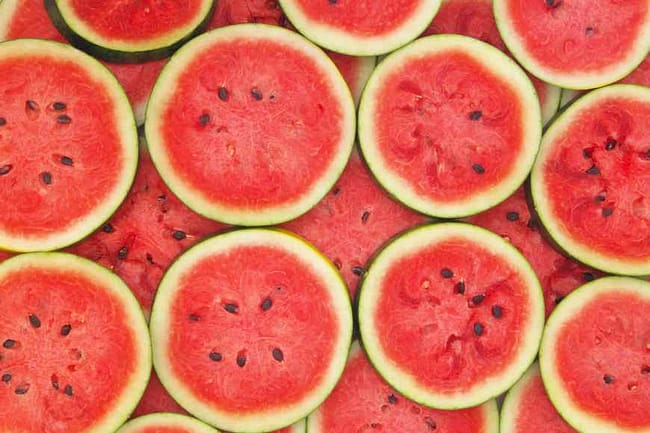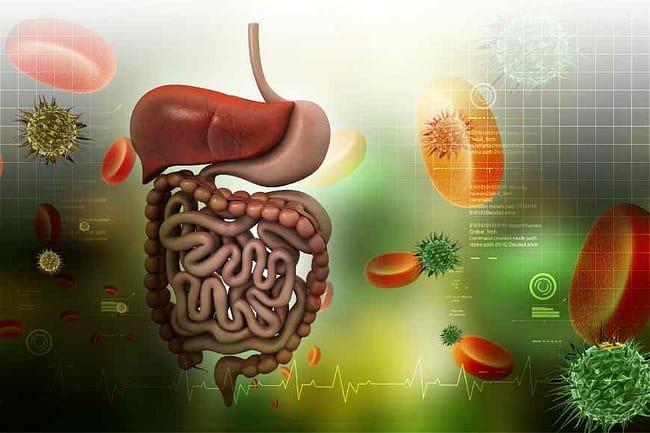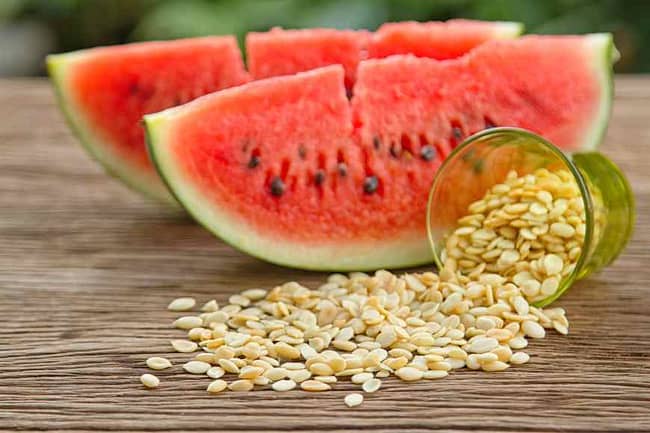Watermelon is not just a tasty summertime treat; this juicy fruit packs a nutritious punch.
With over 90% water content, watermelon is ideal for hydration on hot days.
But the benefits of watermelon go far beyond just quenching thirst.
Watermelon contains vital vitamins, minerals, and antioxidants that provide significant health benefits.
In today’s post, we will explore the top 11 science-backed ways that eating watermelon can boost your health.
Watermelon is Packed With Nutrients

Watermelon is low in calories but high in vitamins, minerals, and antioxidants.
Just one cup of watermelon contains:
- Vitamin C – 21% DV
- Vitamin A – 18% DV
- Potassium – 5% DV
- Magnesium – 4% DV
- Vitamin B6 – 4% DV
- Lycopene – 12.7 mg
- L-citrulline – 0.42 g
The abundance of vitamins C and A in this food item serves as antioxidants that shield your cells from oxidative harm inflicted by free radicals.
Potassium helps control blood pressure by balancing electrolytes and managing fluid levels in the body.
Magnesium is needed for over 300 biochemical reactions and also plays a role in blood pressure control.
Watermelon also contains the antioxidants lycopene and L-citrulline.
Lycopene gives watermelon its red color and offers impressive health benefits, detailed later in this article.
L-citrulline boosts nitric oxide production in the body to improve exercise performance.
With this stellar nutritional profile, it’s easy to see why watermelon should be part of a healthy diet.
What’s The Health Benefits of Eating Watermelon
1. Watermelon Helps You Stay Hydrated
Watermelon is 92% water, making it an excellent way to stay hydrated, especially in the summer heat.
It contains even more water than other fruits like oranges or strawberries.

Dehydration can cause tiredness, headaches, dizziness, and poor concentration.
Meeting your fluid needs is essential for energy, mood, and proper organ function.
Because of its high water content, watermelon effectively promotes hydration.
It also contains electrolytes like potassium that replenish what’s lost through sweat.
Enjoy watermelon as a refreshing snack, or add it to smoothies and salads.
Watermelon juice is also a tasty way to hydrate after an intense workout.
2. Watermelon May Help Manage Weight

Watermelon is low in calories and high in water and fiber, making it a weight-loss-friendly food.
- One cup of watermelon has just 46 calories.
- It is low in fat and contains no cholesterol or sodium.
- The high water content makes watermelon low in energy density. This means you can eat more servings for fewer calories.
- Watermelon provides 0.4 grams of fiber per cup. The fiber keeps you feeling full for longer to curb cravings.
A 2019 study found that eating watermelon daily promoted satiety and decreased body weight, BMI, and hip circumference compared to eating cookies.
- The watermelon group also had lower blood pressure.
- Watermelon makes the perfect guilt-free dessert.
Satisfy your sweet tooth with its natural sugars instead of high-calorie cakes or ice cream.
3. Watermelon Contains the Antioxidant Lycopene
Lycopene is a powerful antioxidant responsible for watermelon’s red color.
This potent compound has been linked to many health benefits.

Studies show that lycopene may:
- Reduce the risk of heart disease
- Protect against sunburn
- Lower inflammation
- Inhibit tumor growth and activity
- Improve sperm quality
- Prevent oxidative damage to cells
Lycopene works by scavenging free radicals that can cause oxidative stress in the body.
Oxidative stress is associated with diseases like cancer, diabetes, and heart disease.
Watermelon is the best dietary source of lycopene.
Guavas, pink grapefruit, and tomatoes also contain lycopene.
4. Watermelon May Improve Heart Health
Heart disease is the leading cause of death worldwide. Lifestyle factors like diet strongly impact your risk for heart attack and stroke.
Watermelon may support heart health in various ways:
- The antioxidant lycopene reduces inflammation and protects LDL cholesterol from becoming oxidized. Oxidized LDL is linked to atherosclerosis (hardening and narrowing of the arteries).
- Citrulline in watermelon helps expand blood vessels, thereby lowering blood pressure.
- Magnesium helps control blood pressure by regulating electrolytes.
- Potassium balances sodium levels to maintain healthy blood pressure.
- The amino acids arginine and citrulline boost nitric oxide levels, which relax blood vessels.
- Vitamin C lowers cholesterol and prevents damage to blood vessels.
A study on middle-aged obese adults found four weeks of watermelon extract lowered ankle blood pressure and cholesterol.
The antioxidant benefits improved their arterial function.
5. Watermelon May Lower Inflammation
Inflammation is your body’s natural response to infection or injury.

Chronic inflammation is linked to diabetes, cancer, arthritis, and heart disease.
Several nutrients in watermelon have anti-inflammatory properties.
The antioxidants lycopene and vitamin C neutralize free radicals to lower oxidative damage and inflammation.
- Cucurbitacin E inhibits the activity of inflammatory enzymes.
- Arginine boosts nitric oxide, relaxing blood vessels and decreasing inflammatory markers like C-reactive protein (CRP).
A study gave watermelon powder to rats on a high-fat diet.
The watermelon group had significantly lower CRP than rats, given the high-fat diet alone.
Enjoying watermelon regularly can help reduce inflammation and oxidative stress in the body.
6. Watermelon May Improve Digestion
Watermelon contains both water and fiber, two critical components for healthy digestion.

Fiber adds bulk to stool, while water helps keep things moving smoothly through the digestive tract.
This promotes regular bowel movements and prevents constipation.
The water and fiber in watermelon act as natural diuretics to flush out toxins and relieve constipation.
However, people with IBS should be mindful of portion sizes as excess fructose and fructans found in watermelon may cause bloating, gas or diarrhea.
7. Watermelon May Improve Eye Health
Watermelon is packed with antioxidants like vitamin C, lycopene, zeaxanthin, and lutein, supporting eye health and preventing vision loss.

The vitamin A in watermelon helps maintain healthy eyesight.
It enables clear vision in low light conditions and colorful vision during the day.
Vitamin C fights free radicals and lowers the risk of cataracts and macular degeneration – common causes of age-related blindness.
Lutein and zeaxanthin accumulate in the retina to filter out UV light rays and blue light emitted from digital devices to reduce retinal damage.
Regularly eating watermelon and other fruits high in antioxidants can keep your eyes healthy as you age.
8. Watermelon May Improve Skin Health
Staying hydrated and eating foods rich in antioxidants promotes healthy, glowing skin.
Watermelon checks both these boxes.

Watermelon is over 90% water. Proper hydration keeps skin cells plump and supple while removing toxins.
Antioxidants like lycopene and vitamin C fight free radicals that can cause signs of aging, like wrinkles and dark spots.
- Vitamin C is also needed for collagen production to maintain firm skin.
- Vitamin A helps repair and renew skin cells.
- The vitamin B6 in watermelon may also help prevent acne breakouts.
You can apply watermelon juice directly to your face as a hydrating mask.
The skin will absorb the nutrients.
9. Watermelon May Relieve Muscle Soreness
Watermelon and watermelon juice have been linked to reduced muscle soreness after exercise in athletes.
Consuming watermelon an hour before working out may improve performance and endurance.
This benefit is attributed to watermelon’s amino acids citrulline and arginine, which are converted to nitric oxide in the body.
Nitric oxide expands blood vessels to enhance blood flow, nutrient delivery, and muscle waste removal.
It may also inhibit lactic acid buildup that contributes to soreness.
Drinking watermelon juice after training also helps replenish carbohydrates and electrolytes lost through sweat.
10. Watermelon May Prevent Macular Degeneration
Age-related macular degeneration is a common cause of irreversible blindness in the elderly.
The antioxidants in watermelon – especially lutein, zeaxanthin, and vitamin C – may help prevent this condition.
Lutein and zeaxanthin accumulate in the retina to absorb UV and blue light that can damage the eyes.
Vitamin C fights free radicals and lowers inflammation.
A study treating retinal cells with lycopene found it decreased oxidative damage and cell death.
Lycopene’s antioxidant properties may explain this protective effect.
Eating watermelon and other fruits high in these compounds can support macular health as you age.
11. Watermelon Seeds Offer Benefits Too

Don’t spit out those watermelon seeds – they are edible and highly nutritious.
Dried watermelon seeds are often roasted and eaten as a snack.
A 1-ounce (28 gram) serving of dried watermelon seeds provides:
- Calories: 158
- Protein: 8 grams
- Fat: 14 grams
- Iron: 4% DV
- Magnesium: 37% DV
- Phosphorus: 20% DV
- Zinc: 13% DV
- Potassium: 5% DV
The protein and healthy fats keep you feeling full.
Magnesium relaxes nerves and muscles, while zinc boosts immunity.
Watermelon seeds can be a tasty, nutrient-dense addition to your diet.
Is Watermelon too High in Sugar?
While it contains natural sugars, it is not considered excessively high in sugar compared to other fruits and sweet treats.
On average, a cup of diced watermelon contains about 9 grams of sugar.
This sugar content is natural and comes from fructose, a type of sugar found in many fruits.
Despite the sugar content, watermelon has a low glycemic index, which means it doesn’t cause a rapid spike in blood sugar levels when consumed in moderation.
Like all foods, moderation is key.
While watermelon is relatively low in sugar compared to other fruits like bananas or grapes, it is still important to consider your overall diet and health needs.
For individuals with diabetes or those trying to manage their sugar intake, monitoring portion sizes and consuming watermelon alongside other low-sugar options is advisable.
It’s worth noting that the sugar content in watermelon is not the same as added sugars found in processed foods and sugary beverages, which can contribute to health problems when consumed in excess.
As part of a balanced diet, watermelon can be a healthy and refreshing addition that provides essential nutrients and hydration without causing significant spikes in blood sugar levels.
Does Watermelon Detox Your Body?
Watermelon is often touted as a natural detoxifier, but it’s essential to understand what “detoxifying” means in this context.

The term detoxification, in the context of popular health and wellness claims, is not based on scientific evidence and can be misleading.
No specific food or drink will single-handedly “detox” your body in the way some marketing may suggest.
That said, watermelon can be a part of a healthy diet, and its high water content can help with hydration, which is essential for overall bodily functions.
Staying hydrated supports the body’s natural detoxification processes, as it helps flush out waste products and toxins through urine and sweat.
While watermelon can be a beneficial part of a balanced diet, it’s crucial to recognize that no magical food will eliminate toxins from your body.
The liver and kidneys are the primary organs responsible for detoxification, breaking down, and removing waste and harmful substances from your body.
A healthy lifestyle with a balanced diet, regular physical activity, sufficient hydration, and adequate sleep is the best way to support your body’s natural detoxification processes.
It’s best to approach the concept of detoxification with a critical mindset and focus on maintaining a healthy lifestyle overall.
What are Some Side Effects of Eating Watermelon
Watermelon is a delicious and hydrating fruit that provides numerous health benefits.
However, like any food, it can have potential side effects, especially if consumed excessively or if you have specific health conditions.
Here are some side effects of eating watermelon to be aware of:
- Upset Stomach: Overeating watermelon in one sitting can lead to stomach discomfort, bloating, and diarrhea due to its high water and fiber content. Moderation is key to avoid these issues.
- Spike in Blood Sugar: Watermelon has a relatively high glycemic index, which means it can cause a rapid increase in blood sugar levels. Individuals with diabetes or insulin resistance should monitor their intake and consider consuming it with other foods to mitigate the impact on blood sugar levels.
- Allergic Reactions: Some people may be allergic to specific proteins in watermelon, leading to symptoms like itching, hives, or swelling. If you experience these symptoms after eating watermelon, you should avoid it and seek medical advice.
- Lycopene Overconsumption: Watermelon is a rich source of lycopene, an antioxidant that gives it its red color and has been associated with various health benefits. However, excessive consumption of lycopene supplements or extremely large amounts of watermelon can cause lycopene buildup in the body, resulting in a condition called lycopenemia. While rare, this can lead to skin discoloration, gastrointestinal disturbances, and other health issues.
- Interference with Medications: Watermelon contains a compound called citrulline, which can interact with certain medications, especially those used to treat hypertension or erectile dysfunction. If you’re taking such medications, consult your doctor before consuming large amounts of watermelon.
- Risk of Contamination: As with any fruit, improper handling or storage of watermelon can lead to bacterial contamination, which may cause foodborne illnesses like salmonella or E. coli. Always wash the fruit thoroughly before cutting and consuming it.
To Sum it Up
Watermelon is clearly much more than just a refreshing summer treat.
This delicious fruit is packed with nutrients and antioxidants that provide unique benefits for your health.
Eating watermelon is a tasty way to stay hydrated, manage weight, and lower inflammation and oxidative stress.
Watermelon may also enhance exercise performance, digestion, heart health, and eye health.
It’s easy to incorporate more watermelon into your diet. Enjoy it in smoothies, salads, and juices for a healthy dessert.
With its impressive nutrient profile, watermelon delivers various science-backed benefits for your overall well-being.
Always consult with a healthcare professional or registered dietitian if you have specific health concerns or questions about your diet.


